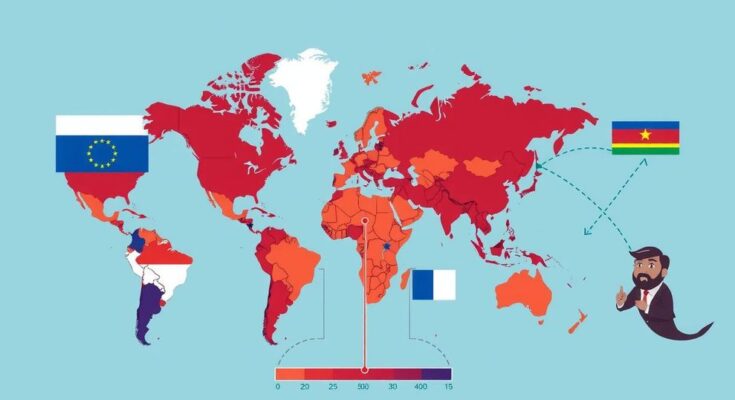In 2024, a significant global anti-incumbent trend led to the removal of various leaders, highlighting the need for governments to shift from crisis management to crafting hopeful, engaging agendas. Social media’s impact on political polarization and public sentiment further complicated these dynamics. To reverse declining public trust, leaders must prioritize economic growth and empower citizens, leveraging innovative ideas and planning for a hopeful future.
In 2024, the political landscape globally witnessed a remarkable shift characterized by a surge in anti-incumbent sentiment, resulting in numerous leaders being ousted from office. This phenomenon challenges governmental structures, underscoring the critical need for incumbents to move away from merely managing crises. Instead, they should focus on crafting aspirational agendas that instill hope among citizens, as articulated by Mohammad Al Gergawi, the UAE Minister of Cabinet Affairs, who stated, “The role of government is to design a future which gives citizens hope.”
Countries such as Senegal, South Africa, India, and Japan exemplify this trend, where incumbents lost significant power. In Senegal, President Macky Sall was defeated amid unsuccessful attempts to delay elections, while in South Africa, the African National Congress (ANC) saw its majority vanish after decades of rule. Similarly, Indian Prime Minister Narendra Modi’s party lost its parliamentary majority, indicating a broader pattern of discontent with long-standing political leadership.
The summer and fall of 2024 showcased further upheaval, with the Labour Party in Britain winning decisively, ending a 14-year tenure of the Conservative Party. Japanese Prime Minister Ishiba Shigeru also lost majority control, and significant political changes occurred in Germany and Canada, where incumbent leaders struggled to maintain authority amidst growing unrest. Popular uprisings played a critical role, as demonstrated by Bangladeshi Prime Minister Sheikh Hasina’s flight amid protests and Syrian President Bashar al-Assad’s flight to Russia as his regime deteriorated.
One compelling explanation for the defeat of incumbents is the pervasive influence of social media. With greater internet accessibility, citizens have expressed heightened distrust toward their governments, exacerbating political polarization. Evidence from the United States indicates an increase in entrenched partisanship, with social media often amplifying extreme viewpoints and fostering a divisive political environment.
However, it is vital to acknowledge that while social media has facilitated the rise of populist sentiments, it has not uniformly guaranteed electoral victories for such movements. In various countries, incumbents and established parties have managed to retain power, albeit with reduced majority control. Thus, it is imperative for governments to improve their engagement with citizens online, as evidenced by the approach taken by advisers to Sir Kier Starmer, who sought direct feedback from the public on their perceptions of government, resulting in descriptors such as “irrelevant” and “authoritarian.”
To rebuild trust, political leaders ought to prioritize economic growth and citizen empowerment. A 2022 study revealed a strong correlation between adverse economic conditions, such as high unemployment and cuts to social spending, and negative public outlooks on government performance. The experiences of Spain, Greece, and Ireland indicate that favorable economic conditions can enhance the incumbents’ chances of re-election, whereas Germany’s economic contraction suggests vulnerability for the ruling coalition.
As political leaders consider future possibilities for their citizens, it is crucial that they adopt long-term perspectives that extend beyond annual budgets, especially given today’s context of rising living costs and challenges stemming from post-pandemic recovery. Historical examples such as the New Deal and the establishment of postwar welfare systems exemplify the success of ambitious government initiatives during challenging periods.
The pressing need for a constructive political agenda emphasizes that aspiring politicians must engage with creative individuals across sectors to envision a hopeful future. Citizens express a demand for a “realistic, meaningful, passionate, hopeful, and empowering” political approach. By addressing these aspirations, political entities can cultivate an environment conducive to restoring public trust and fostering democratic integrity.
In 2024, the global political landscape experienced a dramatic shift where incumbents faced unprecedented losses at the polls or through popular uprisings. Governments found themselves challenged not only by electoral dynamics but also by an evolving digital landscape that shapes public opinion. This trend calls into question traditional political strategies and emphasizes the need for leaders to engage with citizens meaningfully and deliver motivating visions for the future, highlighting the transformative role of government in society.
The recent global anti-incumbent wave illustrates a critical juncture in political governance, where the ability to adapt to public sentiment and foster trust has become paramount. Through effective engagement, economic empowerment, and innovative long-term planning, incumbents can restore faith in democratic systems. As the electorate calls for hope and meaningful leadership, the onus lies on leaders to rise to the occasion and forge a new narrative that aligns with the aspirations of their citizens.
Original Source: www.aspistrategist.org.au




